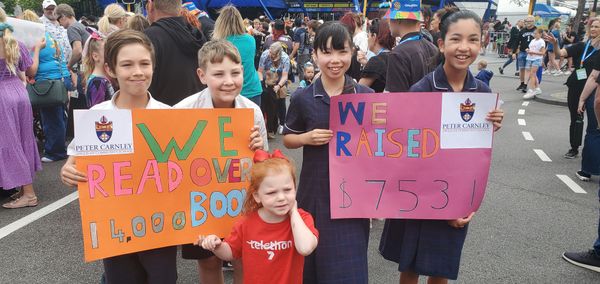Recently the Junior School community took part in the Read-a-thon for Telethon challenge. This was inspired by one of our Kindergarten students, Florence Shanks, who was a 2024 Telethon Little Star Ambassador. Telethon is such a worthy cause to contribute to due to the important work they do in supporting children and their families who have significant health challenges. The read-a-thon challenged students to read and record as many books as they could in a four week period, acknowledging the different ways that students interact with books from Pre Kindergarten through to Year 6. The Junior School community rallied behind the cause raising over $7500 and reading over 14000 books. One student in Kindergarten recorded reading over 85 books (and some of those multiple times!).

This act of service is an important element of our Anglican Identity, providing an authentic opportunity for our students to look at causes within our community and work to assist others who need help. Acts of service should also include an effort component so that the students can recognise that the effort of each individual is required in achieving something together. In this case, the students reading so many books gave them a chance to make an effort in service, while also improving their reading.
In recent years, there has been a shift in understanding how students learn to read. The Junior School teaching team has spent this year engaging with research and understanding best practice in teaching and assessing reading. You may have noticed that all readers that are provided for home reading now are decodable and aligned with the sounds that have been taught in their classroom. Another change is that we are moving away from talking about levels and much of the feedback you will be given about your child’s reading will be based around their accuracy (ability to sound out the words), rate (how fast they read the words on the page) and expression (how well they pay attention to punctuation and the use of tone). These three elements address your child’s reading fluency.
Fluency in reading is important because it is an indicator of how well your child is coordinating many important processes to read. It is also directly related to reading comprehension. We know that if a student is reading too slowly, they are not finding meaning from the words, conversely if a child reads too fast, they will also miss meaning from text. The best indicator of whether a child is reading fluently, is that it should sound like spoken language. Fluency is something that needs to be taught explicitly in each year of Junior School, as the texts become more complex with each year.
There are a few ways that students can practice and improve fluency. One strategy is repeated reading. This is where the student has the opportunity to experience the same book over a range of readings (4-5 times). The repetition allows the student to become more familiar with the words and begin to improve accuracy, pace and expression, leading to better comprehension. This is one of the reasons that home readers are given for a week. Another key strategy to improve fluency is to read aloud and share text with an expert reader. Reading aloud is an important part of reading practice and it is vital that students have the chance to share books with their caregivers.
It is heartening to see our community support our students in reading often and reading well. In working together, we have the best chance to improve students reading outcomes.
God bless,
Ms Kierin Janes
HEAD OF JUNIOR SCHOOL
